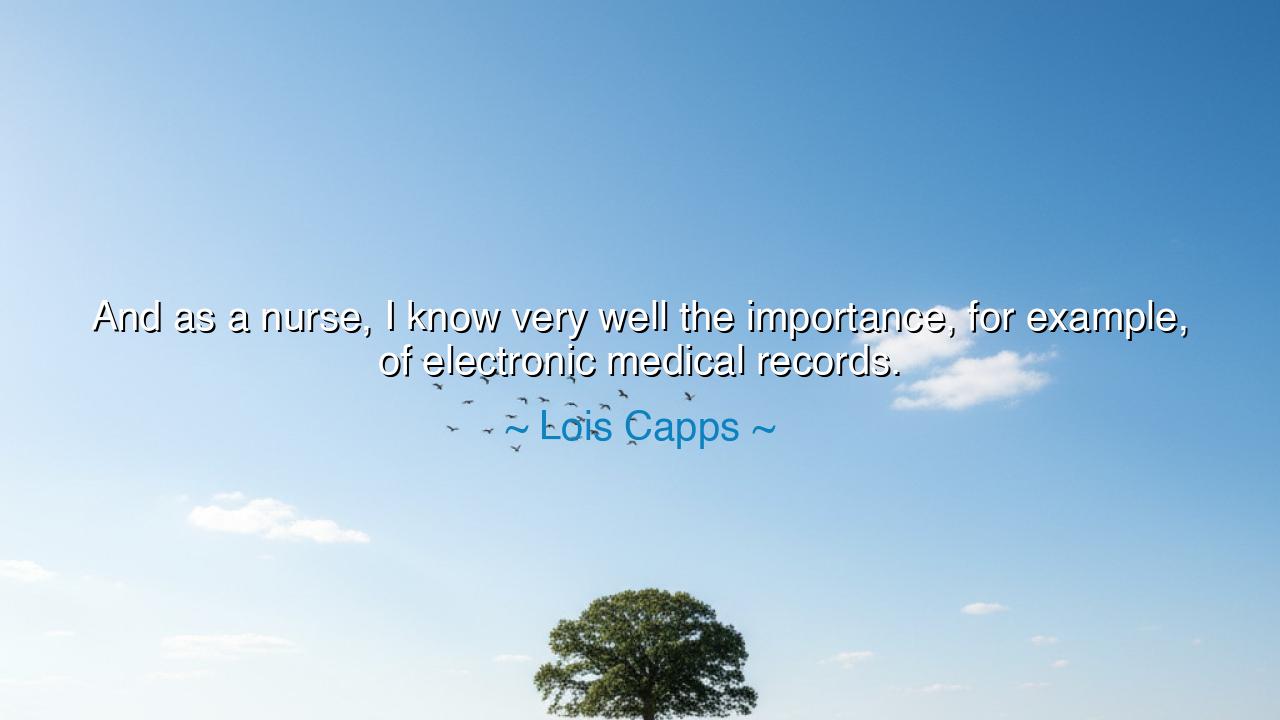
And as a nurse, I know very well the importance, for example, of
And as a nurse, I know very well the importance, for example, of electronic medical records.






In the words of Lois Capps, nurse, leader, and servant of the public good, there lies a message both practical and profound: “And as a nurse, I know very well the importance, for example, of electronic medical records.” Though spoken in the cadence of modern governance, her words hold the quiet authority of lived wisdom — the kind that comes not from policy papers or theories, but from long nights at the bedside of the sick, from the hum of hospital corridors where life and death meet in their eternal dance. Hers is not a statement about machines, but about memory, care, and the sacred duty to remember those who entrust their lives to the hands of healers.
The origin of this quote rests in Capps’s dual calling — as a nurse and a public servant. Before she entered politics, Lois Capps served as a nurse and a public health advocate, witnessing firsthand the fragile thread that connects information to life itself. When she later spoke of electronic medical records, she did not speak merely as a legislator promoting technology, but as a caregiver who had seen the consequences of miscommunication — the lost chart, the missed allergy, the incomplete history that could endanger a life. Her words reflect the union of two worlds: the compassion of the healer and the foresight of the leader.
For what are electronic medical records but the written memory of the modern healer — the new scrolls of the physician, preserving the story of each soul under their care? In ancient times, healers kept their wisdom in papyrus and ink, or in the careful hands of apprentices who memorized the art of diagnosis. Today, that knowledge lives in the pulse of computers, in the glowing screens that carry the legacy of every touch, every heartbeat, every recovery. To Capps, these records are not sterile data; they are the continuation of humanity’s oldest promise — to remember the patient not as a number, but as a story worthy of care and protection.
Consider, then, the story of Florence Nightingale, the founder of modern nursing, who revolutionized medicine not through invention, but through record-keeping. In the filthy wards of the Crimean War, she gathered data — names, symptoms, causes of death — and transformed chaos into knowledge. Through her meticulous records, she proved that cleanliness and organization could save more lives than weapons ever could. Her candle may have burned in a world before electricity, but its light shines in the servers and systems of today’s hospitals. Just as Nightingale’s ledgers birthed the science of nursing, so too do electronic records carry forward her spirit: the belief that precision is a form of compassion, and that knowledge is the greatest act of mercy.
When Capps speaks of their importance, she speaks not only of efficiency but of dignity. For every patient deserves to be remembered accurately — their pain noted, their progress tracked, their humanity respected. In this age of haste and noise, where the human being is often reduced to statistics, she reminds us that the tools of progress must never erase the touch of care. The nurse’s eye, though aided by screens, must still see the person before her. The doctor’s mind, though filled with data, must still be moved by empathy. Technology must serve the soul of medicine, not replace it.
Yet her words also whisper a warning: that as our tools grow stronger, so too must our responsibility. For every record carries not just data, but trust — the sacred trust of those who have revealed their weaknesses, their wounds, their hopes. To mishandle this knowledge is to betray that trust. Thus, as healers and citizens, we must ensure that the march of innovation walks hand in hand with ethics. Electronic medical records are not simply about storage, but stewardship. They call upon us to treat information as we would a patient — with care, accuracy, and reverence.
So, my children, learn from the wisdom of Lois Capps: to serve others, one must first learn to remember them well. Whether through ink, voice, or code, let your records — the works of your hands and hearts — reflect the truth of your compassion. Use the tools of the age not as masters, but as allies, for technology without humanity is cold, but humanity with knowledge is divine. In your work, in your service, in your relationships, keep faithful records — not only of names and numbers, but of kindnesses given, of lives touched, of lessons learned.
For in the end, it is as Capps knew — the healer’s duty is not only to mend the body but to preserve the story of life itself. To remember is to honor, and to honor is to heal. And so, may every record kept, every word written, and every life remembered stand as a testament to that most ancient truth: that in caring, and in remembering, we make the fragile eternal.






AAdministratorAdministrator
Welcome, honored guests. Please leave a comment, we will respond soon